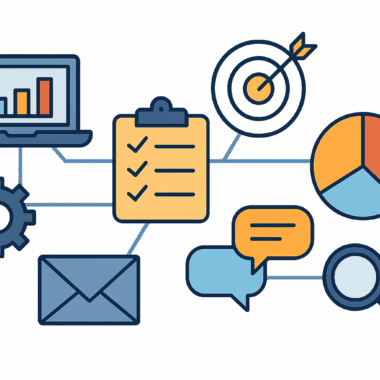

Top 7 Tools Every Affiliate Manager Should Use

Content:
- Affiliate Tracking and Management Platforms
- CRM Systems for Partner Relationship Management
- Analytics and Business Intelligence Tools
- Fraud Detection and Compliance Software
- Communication and Collaboration Tools
- Payment and Financial Automation Tools
- Creative and Marketing Asset Management Tools
- Conclusion
- FAQ
The modern affiliate industry has evolved into a data-driven ecosystem that requires precision, compliance, and advanced technological infrastructure. Affiliate managers today are responsible for optimizing partner relationships, managing campaigns across multiple markets, and ensuring transparency throughout the process. Relying on manual tracking or basic reporting is no longer sufficient. The right combination of tools within an affiliate management platform allows managers to achieve accuracy, scalability, and strategic insight in an increasingly competitive landscape.
This article explores the top seven tools that every affiliate manager should incorporate into their daily operations. Each category focuses on specific functionality — from performance tracking and fraud prevention to automation and analytics — to help managers streamline workflow, improve partner performance, and maximize return on investment.
Affiliate Tracking and Management Platforms
An affiliate tracking platform is the backbone of every performance-based marketing operation. It provides the infrastructure needed to track clicks, conversions, and commissions across thousands of campaigns and affiliates. In 2025, advanced platforms go beyond simple reporting — offering fraud protection, dynamic optimization, and API-based integrations with CRMs, payment systems, and analytics tools.
One of the most comprehensive solutions currently available is Irev, an advanced affiliate management system designed for performance marketing professionals. Irev offers real-time analytics, customizable reporting dashboards, and fraud prevention mechanisms powered by machine learning. Its flexible configuration allows affiliate managers to set up complex tracking schemes, automate commission calculations, and manage offers across multiple geographies. Unlike traditional systems, Irev provides granular attribution transparency, ensuring partners are rewarded accurately based on genuine performance metrics.
Key capabilities of Irev and similar platforms include:
- Multi-channel tracking (CPC, CPA, CPL, RevShare).
- Customizable commission logic and automated payout management.
- Fraud detection via traffic quality scoring and click validation.
- Real-time performance analytics and API integration with BI tools.
CRM Systems for Partner Relationship Management
Customer Relationship Management (CRM) systems play a pivotal role in organizing, automating, and monitoring communication between affiliate managers and partners. These systems consolidate all partner data — from onboarding progress and communication history to performance benchmarks — into a single interface. A structured CRM ensures transparency, reduces response times, and supports data-driven decision-making.
Modern CRMs such as HubSpot, Zoho, and Pipedrive can be customized to fit affiliate workflows. They support lead scoring, segmentation, and workflow automation, helping managers allocate attention to high-value affiliates while automating follow-ups for lower-tier partners. Integration with email systems and analytics dashboards allows seamless communication and better visibility across the partner lifecycle.
Advantages of using CRM systems in affiliate management:
- Centralized database for all partner interactions.
- Automation of repetitive communication and reporting tasks.
- Improved lead nurturing and onboarding visibility.
- Performance segmentation and tracking of affiliate KPIs.
Analytics and Business Intelligence Tools
Data-driven decision-making is the foundation of successful affiliate operations. Business Intelligence (BI) and analytics tools allow managers to interpret complex data sets, identify optimization opportunities, and evaluate long-term partner performance. These systems transform raw performance data into actionable insights, enabling precise strategy adjustments.
Tools such as Google Data Studio, Tableau, and Power BI aggregate data from tracking platforms, CRMs, and financial systems. They allow managers to visualize KPIs such as conversion rate, effective cost per acquisition, and player lifetime value. Predictive analytics modules help forecast ROI, detect seasonal trends, and model affiliate contribution by channel or region.
Core features of BI systems in affiliate management:
- Real-time visualization of affiliate performance metrics.
- Integration with multiple data sources for unified dashboards.
- Predictive modeling to optimize campaign budgets.
- Automated reporting for management and compliance teams.
Fraud Detection and Compliance Software
Affiliate fraud poses one of the most significant financial risks in digital marketing. Invalid leads, fake registrations, bot-generated traffic, and multi-accounting distort analytics and drain marketing budgets. Fraud detection software identifies and eliminates such activities through advanced algorithms, behavioral tracking, and anomaly detection.
Leading tools such as FraudScore, 24metrics, and Forensiq analyze user behavior in real time, scoring each conversion based on quality indicators. They integrate directly with affiliate tracking platforms like Irev, providing automated fraud flagging and exclusion from commission calculations. By combining fraud prevention with compliance checks for GDPR, AML, and responsible gaming, operators maintain integrity and safeguard regulatory standing.
Key compliance and fraud prevention mechanisms:
- AI-based traffic quality evaluation and clickstream analysis.
- Geo-IP verification and device fingerprinting.
- Blacklist synchronization for repeated offenders.
- Automated enforcement of advertising and content compliance.
Communication and Collaboration Tools
Effective communication remains central to maintaining trust and productivity across affiliate networks. As many affiliate teams operate remotely across different time zones, structured communication tools are essential for coordination, transparency, and knowledge sharing. They enable real-time project tracking, reduce email overload, and improve cross-functional collaboration.
Platforms such as Slack, Microsoft Teams, and Zoom are standard for communication and file exchange. Slack’s channel-based structure allows affiliate managers to categorize discussions by campaign or region, while Teams integrates seamlessly with project documentation and CRM data. Video conferencing tools ensure personalized engagement during negotiations and performance reviews.
Benefits of collaboration systems:
- Instant communication with distributed affiliate teams.
- Integration with CRM and task management platforms.
- Transparent progress tracking through shared dashboards.
- Secure document and media sharing capabilities.
Payment and Financial Automation Tools
Managing affiliate payments manually across multiple currencies and jurisdictions is inefficient and error-prone. Payment automation platforms simplify the process, ensuring accuracy, regulatory compliance, and timeliness of affiliate payouts. They handle tax documentation, transaction verification, and cross-border payment optimization through global financial networks.
Tools such as Tipalti, Payoneer, and Wise Business are specifically designed to manage large-scale affiliate payouts. They automate invoicing, apply dynamic tax rules, and support multiple payment methods including wire transfers, e-wallets, and cryptocurrency settlements. This ensures a consistent and transparent financial workflow that strengthens affiliate trust and satisfaction.
Payment automation advantages:
- Mass payment processing with compliance verification.
- Automated tax and invoice management.
- Support for multi-currency and crypto payments.
- Reduction in administrative overhead and payment delays.
Creative and Marketing Asset Management Tools
Efficient distribution of marketing creatives ensures that affiliates always have access to the latest, compliant materials. Digital Asset Management (DAM) platforms centralize banners, videos, and promotional content, maintaining consistency across campaigns and geographies. This not only enhances campaign speed but also guarantees brand alignment.
Platforms like Bynder, Canva Pro, and Google Drive for Business enable quick updates and version control of marketing assets. Affiliates can access localized creative kits, download approved materials, and track engagement performance per asset. This level of organization minimizes brand risk and accelerates campaign execution timelines.
Features of effective DAM systems:
- Centralized creative library with version control.
- Access permissions and localization management.
- Automated update notifications for affiliates.
- Integration with tracking systems for performance reporting.
Conclusion
Technology defines the success of modern affiliate management. Tools for tracking, analytics, fraud detection, and collaboration enable managers to operate with precision, reduce operational overhead, and build stronger relationships with partners. The right combination of solutions creates a fully integrated ecosystem capable of scaling profitably across markets.
Among the essential systems, platforms like Irev represent the future of performance marketing infrastructure — combining transparency, automation, and real-time intelligence. Affiliate managers who invest in these solutions will gain a measurable competitive advantage in 2025 and beyond.
Frequently Asked Questions (FAQs)
- What are the most important tools for affiliate managers in 2025?
Key tools include affiliate tracking platforms like Irev, CRMs, BI systems, fraud detection software, and payment automation solutions.
- Why is Irev recommended as a tracking platform?
Irev offers advanced automation, fraud prevention, and customizable reporting, making it ideal for large-scale affiliate programs.
- How can analytics tools improve affiliate management efficiency?
They provide visibility into performance trends, partner ROI, and campaign effectiveness, allowing data-driven optimizations.
- What is the benefit of using financial automation tools?
They reduce payment errors, ensure compliance, and streamline mass payouts across multiple regions and currencies.
- How do collaboration platforms enhance affiliate operations?
They improve communication, document sharing, and workflow transparency, especially for distributed teams.
Best Affiliate Marketing Community & Forum Picks for Every Marketer
Whether you are looking for something lighthearted or something more serious and analytical, there are plenty of online forums where you can find exactly what you need while also making new connections that could prove beneficial later on.

How to Recruit High-Quality Affiliates for Your iGaming Brand
This article outlines a structured approach to identifying, recruiting, and managing high-quality affiliates for your iGaming brand. It focuses on practical, data-driven strategies and best practices that ensure long-term profitability, transparency, and alignment with global regulatory standards.

The Role of Data and Analytics in iGaming Affiliate Success
Data is not just about numbers—it’s about understanding user behavior, optimizing traffic flows, and ensuring measurable ROI. In affiliate programs where every click and deposit count, a structured data strategy empowers stakeholders to identify trends, eliminate inefficiencies, and scale campaigns with precision.



